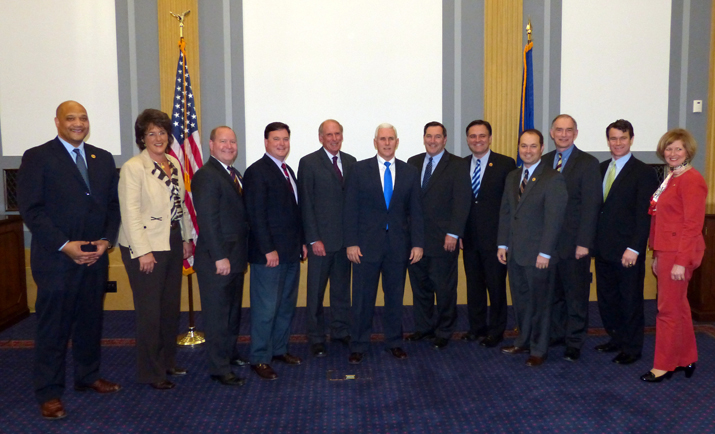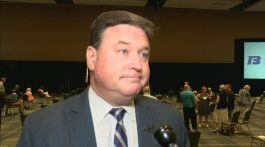Republican members of Indiana’s Congressional Delegation split their votes on the latest budget deal which funds the government for the next two years, lifts the debt ceiling as well as increases spending on defense and domestic programs.
The budget passed the House by a vote of 266 to 167 with 79 Republicans voted in favor and 167 Republicans voting against. Here are some of their statements…
2nd CD – Jackie Walorski – No
- “This budget deal was negotiated behind closed doors, excluded Members from the process and gave us a very short window in which to read and fully understand the ramifications of the policy changes in the bill. This process is not in the best interests of Hoosiers in the Second Congressional District,” Walorski said. “The deal also included $3 billion in cuts to the federal crop insurance program, a perfect example of the devil that lies in the details. I made a commitment to protect farmers in my district, who are the backbone of Indiana’s economy, and I could not support legislation that provided uncertainty to their industry.”
3rd CD, Marlin Stutzman – No
- “This bipartisan budget deal is a disappointing display of fiscal irresponsibility. At the same time that this budget deal lifts the cap on how much money the federal government can borrow, it also lifts the caps on how much Congress can spend. This deal increases the fines bureaucrats can levy on individuals and small businesses, it drastically harms the crop insurance program that is critically important to Hoosier farmers, and robs billions of dollars from retirement Social Security to band-aid the looming insolvency of Social Security Disability Insurance. Half-measures and empty promises are not what the American people expect from their federal government. I look forward to new leadership in the House where we hopefully pursue bold ideas and long-term solutions to our nation’s challenges.”
4th CD, Todd Rokita – No
- “I came to Washington to fight for policies that reduce our debt, balance our budget, and curb Washington’s spending addiction. If we are going to consider raising the debt ceiling, we must include reforms that will reverse the drivers of our debt namely, reforms to Medicare, Medicaid, and other social entitlement programs. I will always support measures that move the ball forward. For example, my 2011 sequester vote, which helped create the discretionary spending caps this budget now busts, was one of the best votes I’ve ever taken in Congress. However, the legislation that the House passed today stunts our progress toward meaningful spending reform. Those in favor of this deal claim we will see minor savings from Social Security Disability to be collected in the distant future. However these savings, which should be used to extend the life of the program, are spent instantly on new discretionary spending. Also, the deal removes today’s spending limits and then counts savings from new spending limits that are meant to be in place ten-years from now. The plan essentially uses the same funds in two different places. This is not a step toward serious entitlement reform, this is Washington cooking its books. Instead of moving forward, this bill moves us backwards in our mission to advance policies that will improve the future for our children and grandchildren. I will not sell our future to pay for this year’s budget”
5th CD Susan Brooks – Yes
- “My primary concern is to govern in a responsible way that will lead to debt reduction in the long-term. The Bipartisan Budget Act we considered today, which passed the House with my support, is fully offset. Moreover, it enacts the first real Social Security reform since 1983 keeping the Disability Insurance Trust Fund solvent and cracking down on fraud. It also provides more funding and certainty for our military, prevents a dramatic and devastating increase in Medicare B premiums for millions of seniors, and averts a dangerous default that would threaten our economy. I voted against raising the debt ceiling two years ago, precisely because no meaningful reforms or spending controls were considered. Our national debt is a national crisis with very real consequences, and it is not fair to leave this mess for future generations. We must consider further reforms to existing programs to inject some discipline into our spending practices as a country, and the package passed by the House today is a step in the right direction.”
6th CD, Luke Messer – Yes
- “While far from perfect, this bill secures long-term entitlement reforms, keeps Medicare premiums from rising, increases funding for our national security, reduces the deficit and safeguards our economy by avoiding default. It also stops the ObamaCare auto-enroll mandate and rejects all of the tax increases proposed by this President. The alternative to this budget was a ‘clean’ debt ceiling increase without any additional support for our troops and without any entitlement reforms. I couldn’t in good conscience let that happen.”
8th CD Larry Bucshon – No
- “I was hopeful we could come to an agreement that would tackle the challenges we face with our nation’s debt,” said Bucshon. “Unfortunately, this deal was negotiated by Congressional leadership and the White House with little input from members, was not adequately vetted through the regular legislative process, and was presented to the House with little notice. That’s not regular order and that’s not the way the process should work. In addition, discretionary spending was increased without substantial enough mandatory spending reforms to not only offset the increase, but put us on a budget trajectory to pay off our $18 trillion national debt. This deal also failed to provide certainty for Indiana’s agriculture industry. The farm bill was reopened and the crop insurance program was changed. Even though the promise of fixing this provision at a later date was made, I could not trust that it would happen. The risk to Indiana’s farmers is too high. Finally, I am pleased additional resources are being invested in our military; however, this goal could have been accomplished through the regular legislative order. Hoosiers want more from Washington. This agreement simply does not reflect the priorities of the people I represent.”














